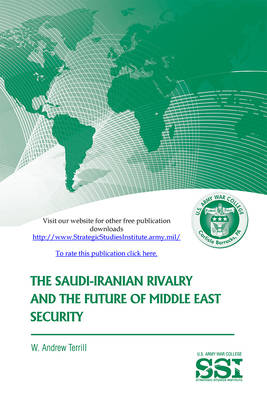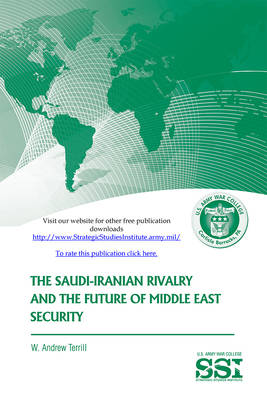
- Retrait gratuit dans votre magasin Club
- 7.000.000 titres dans notre catalogue
- Payer en toute sécurité
- Toujours un magasin près de chez vous
- Retrait gratuit dans votre magasin Club
- 7.000.0000 titres dans notre catalogue
- Payer en toute sécurité
- Toujours un magasin près de chez vous
The Saudi-Iranian Rivalry and the Future of Middle East Security
W Andrew TerrillDescription
Saudi Arabia and Iran have often behaved as serious rivals for influence in the Middle East and especially the Gulf area since at least Iran's 1979 Islamic Revolution and the 1980-88 Iran-Iraq War. While both nations define themselves as Islamic, the differences between their foreign policies could hardly be more dramatic. In most respects, Saudi Arabia is a regional status quo power, while Iran often seeks revolutionary change throughout the Gulf area and the wider Middle East with varying degrees of intensity. Saudi Arabia also has strong ties with Western nations, while Iran views the United States as its most dangerous enemy. Perhaps the most important difference between the two nations is that Saudi Arabia is a conservative Sunni Muslim Arab state, while Iran is a Shi'ite state whose senior politicians often view their country as the defender and natural leader of Shi'ites throughout the region. The rivalry between Riyadh and Tehran has been reflected in the politics of a number of regional states where these two powers exercise influence including Iraq, Lebanon, Syria, Egypt, Bahrain and others.
The 2011 wave of pro-democracy and anti-regime protests known as the "Arab Spring" introduced new concerns for both Saudi Arabia and Iran to consider within the framework of their regional priorities. The Saudi-Iranian rivalry is therefore likely to intensify as a central feature in the Middle Eastern security landscape that reaches into both the Gulf region and the Arab-Israeli theater. This is a reality that will touch upon the interests of the United States in a number of situations. In many instances, Saudi opposition to Iran will serve U.S. interests, but this will not occur under all circumstances. Saudi Arabia remains a deeply anti-revolutionary state with values and priorities which sometimes overlap with those of Washington on matters of strategic interest and often conflict over matters of reform and democracy for other Middle Eastern states. Additionally, in seeking to support Middle Eastern stability, the United States must be prepared to mediate between Riyadh and Baghdad, and thereby help to limit Iranian efforts to insert itself into Iraqi politics.
Related products:
Other products produced by the US Army War College, Strategic Studies Institute can be found here: https: //bookstore.gpo.gov/agency/1609
Africa and the Arab Spring: A New Era of Democratic Expectations can be found here: https: //bookstore.gpo.gov/products/sku/008-020-01642-0
Spécifications
Parties prenantes
- Auteur(s) :
- Editeur:
Contenu
- Nombre de pages :
- 93
- Langue:
- Anglais
Caractéristiques
- EAN:
- 9781584875185
- Date de parution :
- 01-02-15
- Format:
- Livre broché
- Format numérique:
- Trade paperback (VS)
- Dimensions :
- 152 mm x 229 mm
- Poids :
- 170 g

Les avis
Nous publions uniquement les avis qui respectent les conditions requises. Consultez nos conditions pour les avis.






